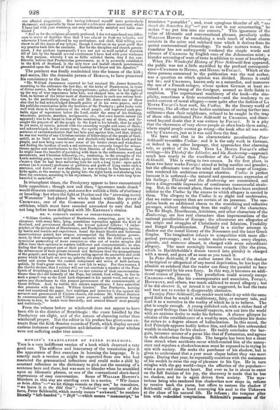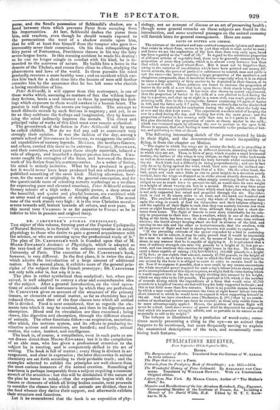HOWITT'S TRANSLATION OF PETER SCHLEMIEL. True is a very indifferent
version of a book which deserved a very good one. The stiffness and inaccuracy of the translation give it the appearance of first exercises in learning the language. It is exactly such a version as might be expected from one who had mastered the grammatical inflections and could make a shift by constant reference to the dictionary to pick out the meaning of a sentence here and there but was sure to blunder when he stumbled upon an idiomatic phrase, or one of the conventional short-hand expressions of easy conversation. Some of WILLIAM Howerv's blunders in this way are startling even in a novice. " Wir lassen as bairn Allen"—" we let things remain as they are," he translates, "we leave it to the Old One" ; "linhisch"—an attribute of the hero, Peter Schlemihl, which merely means "awkward," he renders literally "left-handed"; "Heft"—which means "manuscript," he translates " pamphlet" ; and, most egregious blunder of all, " uns durch die Sonnetten lief"—" put us out in our sonneteering," he makes " we put him into our sonnets." This ignorance of the value of idiomatic and conversational phrases, peculiarly unfits WILLIAM HOWIT'T for translating a work much of' whose charm consists in the naive and subdued tone which it derives from its quaint conversational phraseology. To make matters worse, the translator has not unfrequently rendered the simple words and phrases of Cuastrsso by English ones of the Johnsonian mint ; a blunder savouring of want of taste in addition to want of knowledge. When The 1Vonderful History of Peter Schlemihl first appeared, the public was not a little mystified by the prefixed correspond- ence—Cussusso to HITZIG, and H1TZIG 10 FOUQUi. Which of the three persons concerned in the publication was the real author, was a question on which opinion was divided. Hirziu it could not be ; and Cuascrsso, known only as a naturalist, and moreover the son of a French refugee, whose spoken German at least re- tained a strong twang of the foreigner, seemed as little liable to suspicion. The supernatural machinery of the book—the sim- plicity, sometimes a little overstrained—and the tendency to an under-current of moral allegory—were quite after the fashion of LA MOTTE FOUQUE'S best work, his Undine. So the literary world of Germany, like all other wise bodies ambitious of seeing further into millstones than their neighbours, refused to be caught in the trap of those who attributed Peter Schlemihl 10 CEAMISSO, and disco- vered beyond doubt that it was written by FOUCLIA. It is a pity that the cleverness of very clever people so often leads them astray, where stupid people cannot go wrong—the book after all was writ- ten by Cusluisso, just as it was said from the first.
We have said that in its characteristic peculiarities Peter Schlemihl resembles Undine: and it is the only work in German, or indeed in any other language, that approaches that charming tale, so perfect of its kind. Even Li MOTTE FOUQUell other writings—his 2'hiodolf der Isliindcr, and his Zauberring—approach much less nearly to the excellence of the Undies than Peter Schlemihl. This is owing to two causes. In the first place, in these two later works FOUQUE aimed at being manlier and grander; but the effeminate tone of his mind and limited range of imaaina- tion rendered his ambitious attempt abortive. Undine is perfect because it is unforced—the natural and spontaneous expression of his feelings : Thiodolf and the Zauberring are constrained, and leave a disagreeable impression of continuous unsuccessful strain- ing. But, in the second place, these two works have been rendered inferior to the Undine by the excess to which allegory is carried in them. The allegory in the Undine is so slight and unobtrusive, that we rather suspect than are certain of its presence. The sus- picion lends an additional charm to the moralizing and reflective passages' without detracting from the reality of the characters. The Sir Hugh, Montfaucon, Arinbiorn, and other characters of the Zauberring, are less real characters than impersonations of the national peculiarities of Europe : the adventures are allegories of the origin and struggles of Christianity and Islamism, Feudality and Burgal Republicanism. Thiodolf is a similar attempt to shadow out the moral history of the Norsemen and the later Greek Empire. The imagination refuses to sympathize with mere alle- gorical personages ; and to render matters worse, every chapter, episode, and sentence almost, is charged with some subordinate allegory. The most seemingly innocent remark (like the pirns, which in Hubblebubble's dream turned into pistols) is charged with a moral, and goes off as soon as you touch it. In Peter Schlemihl, if the author meant the loss of the shadow to be typical or allegorical of any moral deprivation, he has kept the allusion so subdued that the reader can fancy the parallel to have been suggested by his own fancy. In this way, it becomes an addi- tional source of pleasure. The parallelism could scarcely escape CHAMISSO —who, like his contemporaries and associates, FOEQUi, Horesistor, and others, was much addicted to moral allegory ; but if he did observe it, or intend it to be suggested, he had the taste and tact not to render it disagreeably obtrusive. To enjoy Peter Schlemihl, the reader must take it up with the same good faith that he would a traditionary, fairy, or nursery tale, and read it as a narrative in the reality of which he is to believe. The plot is simple enough. A young unlicked cub, with a richer fund of deep good feelings than he himself suspects, sets out into the world with an anxious desire to make his fortune. A chance glimpse he obtains of the establishment of a wealthy man, stimulates his desire for riches to a degree almost of hallucination. In this mood, the Evil Principle appears bodily before him, and offers him unbounded wealth in exchange for his shadow. He rashly concludes the bar- gain becomes master of a purse like that of Fortunatus, and agrees to walk shadowless through life. The bargain has been but a short time struck when accidents occur which remind him of the annoy- ance and repulses a shadowless man must be exposed to in trying to mix with society. He seeks the purchaser of his shadow, but is given to understand that a year must elapse before they can meet again. During that year, he repeatedly contrives with the assistance of his wealth to raise the cup of pleasure to his lips. He in turn mingles with the gay world—buys the affection of the populace— wins a pure and constant heart. But ever as he is about to enter on the full fruition of his joy, the discovery is made that he has no shadow, and he is again driven from society. The mys- terious being who rendered him shadowless now steps in, refuses to receive back the purse, but offers to restore the shadow if Schlemibl will sign a bond conveying his soul to the Unknown at the close of his natural life. He refuses ; the tempter plies him with redoubled temptations. Schlemihrs possession of the
purse, and the fiend's possession of Schlemihrs shadow, are a bond between them which prevents Peter from escaping from his importunities. At last, Schlemihl dashes the purse from him, and resolves, even though he should remain exposed to the persecutions the want of a shadow entails upon him,
that he will at least free himself from the tempter who gave it—irrevocably sever their connexion. On his thus relinquishing the
fairy purse of Fortunatus, Providence throws in his way the fairy seven-league boots. In this seeming accident he reads his destiny : as he can no longer mingle in comfort with his kind, he is re- manded to the converse of nature. He builds him a home in the deserts of the Thebais, and roams from clime to clime, studying the phenomena and laws of the world. In these pursuits his mind gradually, recovers a more healthy tone ; and an accident which car- ries him back for a short time into the haunts of men still further consoles him by the assurance that he has left some who cherish a loving recollection of him. Peter Schlemihl, it will appear from this restrospect, is one of those works which, assuming as matters of fact the wildest legen- dary fictions, lends a real interest to them by portraying the feel- ings which exposure to them would awaken in a human heart. The passion is real though the events are impossible. The attempt to teach didactic morals by such fictions is nugatory ; and yet, in so far as they cultivate the feelings and imagination, they by human- izing the mind indirectly improve the morals. The direct and principal value of works of this kind must ever remain msthetical. The groundwork of the fiction in Peter Schlemihl will by many be called childish. Nor do we feel any call to controvert very strongly their opinion. It was the fashion of the day, among a certain school of litterateurs iu Germany, to exaggerate the artisti- cal capabilities of nursery legends. MusA:us, the brothers GRIMM, and others, carried this taste to its extreme. Fouea, HorrstAxe, and their associates, seized upon these simple materials, infused a vein of allegory, and breathed a deeper passion into them. CHIA- basso caught the contagion of the hour, and borrowed the frame- work of his fiction from his contemporaries. As a writer of fiction, his mind is strictly imitative. What he has produced is good ; but it would never have been produced had not others previously published something of the same kind. Making allowance, how- ever, for the want of originality in the general conception, and for the questionable taste of selecting nursery inytholoay as a medium for expressing pure and .elevated emotions, Peter Schlemild evinces literary talents of a high order. Graphic power, a deep sense of the beautiful, and quaint and playful humour, are combined with an utter want of exaggeration or striving after effect. The moral tone of the work stands very high : it is the true Christian moral— severe towards self, lenient towards all others, and ever pure. In this moral tone Ctramisso is as far superior to Fououi: as he is inferior to him in passion and original fancy.



























 Previous page
Previous page